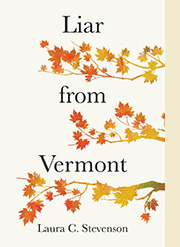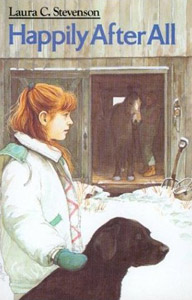A New Series: One Minute Reviews of
Books by Vermont Authors
Laura's column "One Minute Reviews" has appeared bi-weekly in Wilmington, Vermont's Deerfield Valley News since 2015. In April 2018, she found that no Vermont periodical consistently reviews all commercially published fiction and non-fiction by Vermont authors, so she started a series to fill that void. Published reviews from that series and some earlier reviews of local authors are listed with links to a scan of the printed copy. Reviews still in queue are listed without links until they appear in print.
The books reviewed in this series are available through Wilmington's Pettee Memorial Library, the Whitingham Free Public Library, and locally owned Bartleby's Books in Wilmington.
Deerfield Valley News, 6/20/2024
Huckleberry Finn, Reconsidered
Percival Everett, James. Doubleday, 2024
Mark Twain’s The Adventures of Huckleberry Finn has had many adventures of its own. Praised in the mid-twentieth century by the critic Lionel Trilling as “one of the world’s great books and one of the central documents of American culture,” yet banned in American libraries and schools from 1885 to the present, it has always been controversial for the way it looks American racism directly in the face. The book’s face—and the wonderful voice that goes with it—is Huck’s. At least, it has been. But now, Percival Everett’s James has recast the journey down the Mississippi in the voice of Jim, the escaped slave with whom Huck travels. The change of narrators gives the adventure a tone that promises to linger in readers’ minds long after they have read either book.
Everett has met the challenge of writing a full-length novel in the “Missouri Negro dialect” Twain painstakingly created for his Jim by making his narrator—and all slaves—bilingual. Among themselves, with no Whites within hearing, they speak grammatical English. But when Whites (including Huck) are present, slaves speak a vernacular deliberately designed assert their inferiority. As Jim explains it, dialect helps to ensure “safe movement through [a] world” in which the possibilities of whipping, lynching, rape or sale hover over all slaves, and in which words or postures that suggest independent Black thought are punishable as challenges to White superiority. As the slave children whom Jim instructs in this dialect tell him, “the better they feel, the safer we are.” Jim asks for a translation: “Da mo’ betta dey feels, da mo’ safer we be.”
Dialect, in short, is a kind of performance that slaves put on to placate their masters. In Part I of the journey down the Mississippi, it remains little more than this; Jim’s elegant prose, which extends into his occasional “dialogues” with John Locke, Voltaire and other philosophers he has secretly read in Judge Thatcher’s library, alternates with the dialect he speaks with Huck, the King and the Duke, and other Whites. Late in the book, when he speaks true English to Huck, the shocked boy accuses him of lying to him all his life. Later still, when he forces Judge Thatcher to reveal the whereabouts of Jim’s wife and daughter, whom he has sold to a breeding farm, he notices that Thatcher is more frightened by his diction than by his physical power.
The anger behind Jim’s bilingualism increases in Parts II and III, as the book departs from Twain’s plot and follows Jim’s metamorphosis into James. The turning point occurs when Jim is hired (not sold) as a tenor by the Virginia Minstrels, a White group that performs in blackface. Suddenly, the line between Black and White is erased: upon hiring Jim, the group’s leader shakes his hand. One member, light enough to “pass,” tells Jim in dialect that he doesn’t need to use it. And so the group marches into town: “ten white men in blackface, one black man passing for white and painted black, and me, a light-brown black man painted black in such a way as to appear like a white man trying to pass as black.” Fully aware of the irony, Jim is still shocked by his reception as he catches the eyes of a few spectators: “the way they looked at me was different from any contact I had had with white people.” Suddenly, he is an equal, complicit in denigrating laughter at “darkies.” The scene is as bitterly comic as any of Twain’s.
James’s dark ending contrasts sharply with the conclusion of Huckleberry Finn, but Everett’s respect for Twain is clear. Everett’s book amplifies the portrait of “man’s inhumanity to man” that puzzles and disgusts a thirteen year old White boy by presenting it from the point of view of an intelligent Black man subject to the inhumanity of slavery. The change makes James as controversial as Huckleberry Finn, but as a wonderful read and a “central document of American culture,” it is a worthy successor to a classic.


